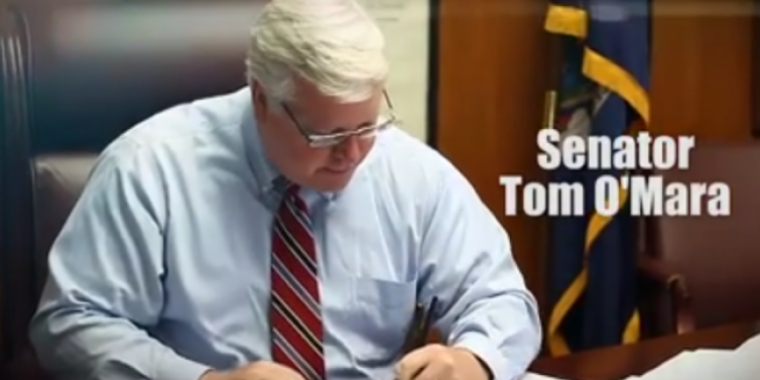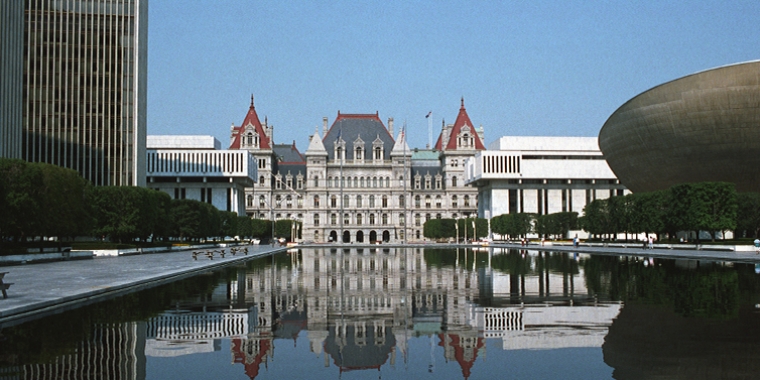
Senator O'Mara's weekly column 'From the Capitol' ~ for the week of January 29, 2020 ~ 'Consequences of a questionable state budget'
June 29, 2020
-
ISSUE:
- persons with disabilities

Senator O'Mara offers his weekly perspective on many of the key challenges and issues facing the Legislature, as well as on legislative actions, local initiatives, state programs and policies, and more. Stop back every Monday for Senator O'Mara's latest column "From the Capitol..."
This week, "Consequences of a questionable state budget"
In early April, just after the start of the COVID-19 shutdown and shortly following the enactment of the 2020-2021 state budget, I highlighted the core reason why I said no to a budget rammed through by Governor Andrew Cuomo and a state Legislature under one-party control.
In the budget’s aftermath I wrote, “Heading into this budget, I expressed hope that state leaders would enact a streamlined budget that straightforwardly focused, above all else, on the coronavirus response…That, in my view, would have been common sense. It would have been responsible. It would have been fair. That, however, is not what happened and now we need to be ready for these consequences too. The new budget, particularly for upstate New York and the regions I represent, is a fiscal plan that contains too much business as usual, questionable spending and borrowing, and a non-budget-related pursuit of a so-called ‘progressive’ political agenda that unnecessarily and unfairly produces additional fiscal and economic burdens and uncertainties for those I represent, even long after the COVID-19 response mission is complete.”
In other words, I opposed this new budget because, at its core, it is not responsible, fair or sensible. Worst of all, the long-term negative consequences for this region were too great.
We’re already starting to see these consequences. One of the most egregious actions of this budget was that it gave Governor Cuomo unprecedented, unilateral powers to revise the budget, as he and he alone sees fit, no legislative approval required. It is a remarkable relinquishing of legislative checks and balances, and it’s dangerous.
In short, Governor Cuomo and Governor Cuomo alone gets to decide who wins or loses in the weeks and months ahead. That’s unbelievable, in my view, until you consider that it certainly lets the Legislature’s downstate, Democrat, extremely liberal leaders off the political hook for the governor’s dirty work, including funding cuts.
Except that it won’t work in the end and everyone needs to understand that they and their supporters all need to be held accountable and responsible.
For example, the Cuomo administration has proposed a cut of nearly $240 million for the state Office of People with Developmental Disabilities (OPWDD), set to take effect on July 1, 2020. Last week, in a letter to the governor, I highlighted the devastating consequences of this proposal. It has been brought to my attention by the non-profit providers of residential services, direct support professionals and, especially, the families of persons with intellectual and developmental disabilities (IDD) for whom these residences and services are irreplaceable lifelines.
In this specific instance, I am urging, together with area Assemblymen Phil Palmesano and Chris Friend, Governor Cuomo to immediately reconsider a cut that would only serve to exacerbate the ongoing COVID-19 crisis by imposing an unreasonable hardship on the already hard-pressed IDD service providers and frontline workers who, by the way, we have called on throughout this emergency to protect one of our most vulnerable populations.
Part of this ill-timed cut is based on what the Cuomo bureaucracy has defined as a “vacancy rate cut.” It essentially means that individuals with intellectual or development disabilities who are hospitalized (and keep in mind that this is one of our most vulnerable, at-risk populations for COVID-19), the time of their inpatient stay at a hospital will be considered an “empty bed” at the residential facility and the facility will not be reimbursed for that time.
It’s a purely bureaucratic maneuver. It equals a fiscal attack on residential providers that could force some of them to close or, at the very least, runs the risk of leaving hospitalized individuals with an IDD left with no place to return home to following their release from the hospital.
That’s unconscionable. It’s callous. It flies in the face of everything that Governor Cuomo has been telling us over and over constitutes the New York Way, including smart and loving.
In our recent letter to the governor, we wrote, “Your proposed vacancy rate cut, in our view, is ill-timed, unnecessary, and stands only to deliver a callous threat, at this worst possible time, to this vulnerable population and their families and loved ones for whom these community-based residences, programs, and services are nothing short of irreplaceable…it runs the terrible and unconscionable risk of forcing persons with IDD from their homes and their families and caregivers scrambling to arrange and navigate services that are already hard to find and adjust to…In our opinion, the proposed vacancy rate cut is a callous, out-of-touch, bureaucratic fiscal attack on the very residential services that New York State should be considering and treating as essential moving forward. In short, there must be a better, more compassionate and more sensible solution.”
Which leads back to the new state budget where, believe me, there are plenty of places to look for savings other than cutting aid to localities or vulnerable populations. How about the estimated $200 million it’s now going to cost state and local taxpayers to fund political campaigns? Or the more than $400 million it costs state and local taxpayers to subsidize Hollywood movie productions?
There are plenty of other examples in this new budget of questionable priorities and expensive giveaways to so-called “progressive” priorities favored by Governor Cuomo and the downstate, one-party state Legislature.
Let’s start there before we start trying to balance the books on the backs of vulnerable populations. The COVID-19 response has already taken an enormous toll on every sector across the local, state and federal spectrum of agencies and organizations. It will continue to demand, for the foreseeable future, a constant reassessment and reordering of governmental practices, priorities and responsibilities, and I look forward to continue being, at least, a voice for balance and fairness.



